sisco fixed ethylene gas detector uses high quality sensors, and advanced micro-process technology, with data display and high/low alarm, fast response, high precision and good stability. Explosion proof, suitable for different kinds of situations.
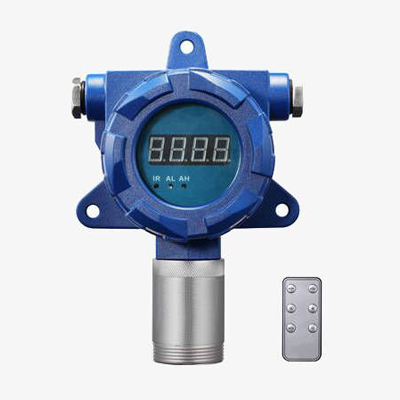
Anti-magnetic interference
- The fixed ethylene gas detector can resist the strong magnetic interference of 15V/meter.
- In areas with dense magnetic products or dense electronic products, such as tunnels, mines, confined spaces, etc., the data is guaranteed to be stable and reliable.
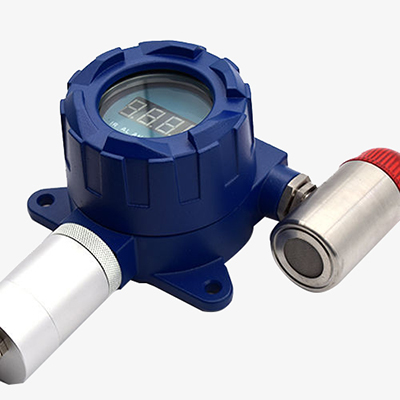
Using high-precision sensors
- The fixed online C2H4 gas detector is equipped with an infrared remote control as standard, which can realize the functions of alarm point setting, zero point calibration, and address modification without opening the cover.
- Compatible with various control alarms, PLC, DCS and other control systems to realize remote monitoring.
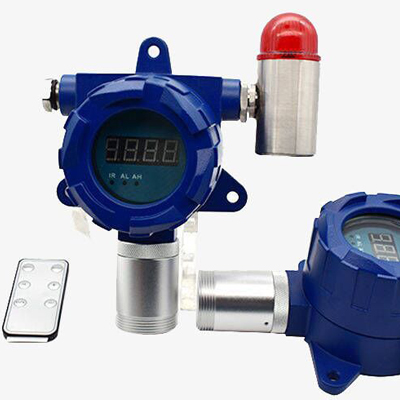
Variety of installation methods
- Wall mounted type, installed on the wall directly, real time monitoring.
- Piping type, installed on the pipeline, monitoring the gas concentration inside.
- Flow type, connected with external sampling pump and tube, measure the gas concentration in enclosed space.
Applications
Fixed ethylene C2H4 online gas detector can detect harmful gas of furniture, flooring, wallpaper, paint and other items, which is widely used in biological pharmaceutical factories, green home, livestock and poultry breeding, greenhouse cultivation, warehousing and logistics, brewing and fermentation, agricultural production, etc.
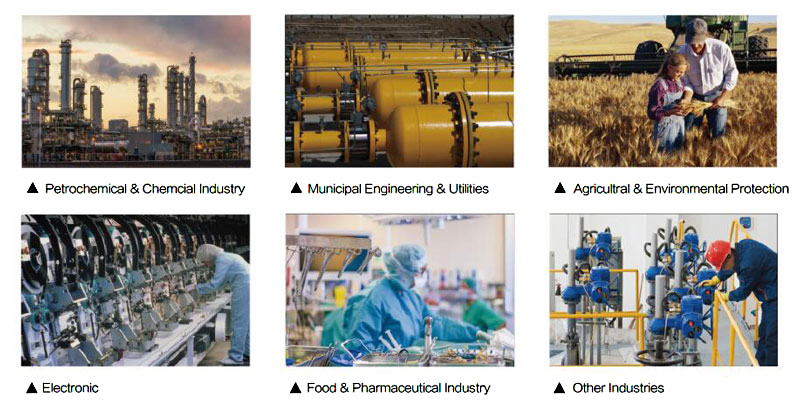
| Model | GD300-C2H4 |
| Detection Principle | High Precision PID (0-10/20ppm), Electrochemistry (0-50/100/500/1000/2000ppm) |
| Gas | Ethylene (C2H4 ) |
| Measure Range (Optional) | 0 to 10ppm, 0 to 20ppm, 0 to 50ppm, 0 to 100ppm, 0 to 500ppm, 0 to 1000ppm, 0 to 2000ppm |
| Calibration Kit | Gas pressure regulator (calibration gas cylinder NOT included) |
| Install Method | Wall-mounted, piping type, flow-type (according to the detected environment) |
| Output Signal (Optional) |
4-20mA and RS485. Relay output: one group of relay output (1NO+1NC, 24V 100mA) for one alarm (default), or two groups of relay output (2NO+2NC, 24V 100mA) for high/low alarm (optional). |
| Resolution | 0.01ppm (0-10/20/50ppm), 0.1ppm (0-100ppm), 1ppm (0-500/1000/2000ppm) |
| Accuracy | ≤±3% F.S. |
| Response Time | ≤10s |
| Repeatability | ≤±1% |
| Recovery Time | ≤10s |
| Linearity Time | ≤±1% |
| Zero shift | ≤±1%(F.S./year) |
| Display | High light nixie tube display |
| Connection mode | Power connection type: G1/2 male thread explosion-proof flexible pipe Pipe-mounted type: M45*P2.0 |
| Working Voltage | 12-36V DC |
| Case Material | Die-casting aluminum housing |
| Temperature | -20℃ ~ 50℃ |
| Humidity | 0-95%RH (non-condensing) |
| Operation Time | 24h |
| Explosion-Proof | Ⅱ 2G Ex ia Ⅱ CT4 Ga |
| Degree of Protection | IP65 |
| Alarm Mode | Sound, light |
| Material | Case: Die-cast aluminum, Sensor housing: aluminum alloy or 316 stainless steel |
| Power | 12-36V DC |
| Weight | 206*179*90mm |
| Dimension | 1.6kg |
| Approval | CE, ATEX (Standard: EN IEC 60079-0:2018, EN 60079-1:2014) |
| Accessories | Power adapter: Input 100-240VAC 50/60Hz, Output 24VDC 1A (Optional USA plug, Europe plug or UK plug) |
Note: To measure confined spaces such as pipelines, please contact us and inform the detailed conditions of use.
Fixed Ethylene (C2H4) Gas Detector Dimension (Unit: mm)
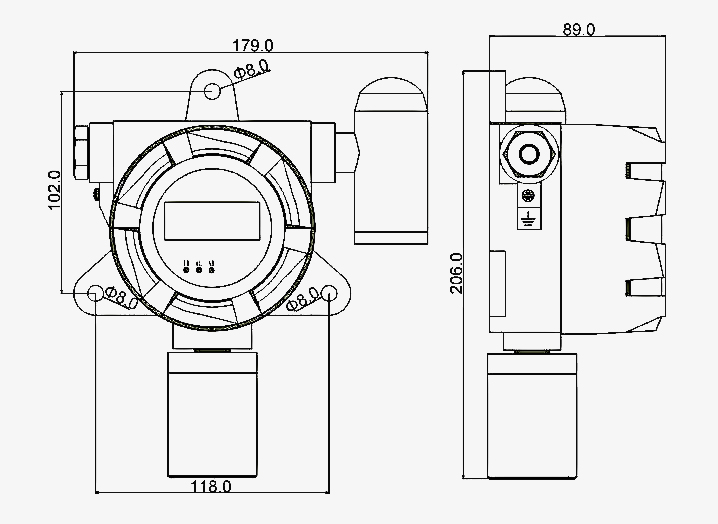
Gas Detector Catalog & User Manual
 SISCO Gas Detector Catalogue
SISCO Gas Detector Catalogue SISCO GD200 Portable Gas Detector User Manual
SISCO GD200 Portable Gas Detector User Manual SISCO GD300 Online Fixed Gas Detector User Manual
SISCO GD300 Online Fixed Gas Detector User Manual SISCO GD400 Explosion Proof Portable Gas Detector User Manual
SISCO GD400 Explosion Proof Portable Gas Detector User Manual SISCO GD500 Handheld Multi Gas Detector User Manual
SISCO GD500 Handheld Multi Gas Detector User Manual SISCO GD600 Multi Gas Analyzers User Manual
SISCO GD600 Multi Gas Analyzers User Manual SISCO Gas Detector Communication Protocol V1.0
SISCO Gas Detector Communication Protocol V1.0 SISCO Single Stage Pressure Regulator User Manual
SISCO Single Stage Pressure Regulator User Manual SISCO Gas Detector Data Downloading Operation Instruction
SISCO Gas Detector Data Downloading Operation Instruction
Q1: What is a fixed gas detector?
A1: The fixed gas detector is composed of sensors and transmitters, and is installed at the detection site. The secondary instrument consisting of circuit, power supply and display and alarm device is installed in a safe place, which is convenient for staff to monitor. In industrial installations and production processes, fixed gas detectors are generally used, because fixed gas detectors can be installed at specific detection points to detect specific gas leaks.
Q2: What does a gas detector detect?
A2: Combustible gases: Natural gas (methane), liquefied gas, coal gas (hydrogen), acetylene, pentane, alkynes, acetone, toluene, alcohols, hydrocarbons, light oil, etc.
Toxic gases: Carbon monoxide, hydrogen sulfide, ammonia, chlorine, oxygen, phosphine, sulfur dioxide, hydrogen chloride, chlorine dioxide and other toxic and harmful gases.
Q3: Difference between fixed gas detector and portable gas detector
A3: The biggest advantage of fixed gas detectors is 24-hour uninterrupted measurement. As long as the power is turned on, the fixed gas detector is in normal detection work. Portable gas detectors are usually used in confined spaces and confined spaces, but the gas environment in these spaces is usually very complex, and there will be situations such as lack of oxygen and high concentrations of harmful gases.
Tips: Why use an ethylene gas detector?
Hydrogen chloride is a toxic and harmful gas, which is widely used in various industrial chemical and biopharmaceutical enterprises, or is often generated or discharged in various production and manufacturing. Therefore, we need to have more hydrogen chloride in various environments. When the corresponding inspection is carried out.
C2H4 gas has a strong anesthetic effect. Inhalation of high concentrations of ethylene can cause immediate loss of consciousness, with no obvious excitatory period, but can quickly wake up after inhalation of fresh air. Slightly irritating to eyes and mucous membranes of respiratory tract. Liquid ethylene can cause frostbite to the skin. Long-term exposure can cause dizziness, general malaise, fatigue, and inability to concentrate. Individuals have gastrointestinal disorders. Moreover, ethylene is harmful to the environment and can cause pollution to water, soil and atmosphere. Therefore, it is very necessary to use an ethylene gas detector to detect C2H4 gas.
Thank you for buying industrial test and measurement equipment on SISCO.com, all products sold by SISCO and the partner cover a 12 months warranty, effective from the date of receiving the products.
What is covered?
SISCO is responsible for providing free spare parts, and free technical support to assist the customer to repair the defective products until the problem is solved.
What is not covered?
- Product purchased from anyone other than a SISCO store or a SISCO authorized reseller.
- Expendable parts.
- Routine cleaning or normal cosmetic and mechanical wear.
- Damage from misuse, abuse or neglect.
- Damage from use of parts other than SISCO approved.
- Damage from use outside the product’s usage or storage parameters.
- Damage from use of parts not sold by SISCO.
- Damage from modification or incorporation into other products.
- Damage from repair or replacement of warranted parts by a service provider other than a SISCO authorized service provider.
- Damage caused by the application environment not meeting the product usage requirements and the failure to perform preventive maintenance.

